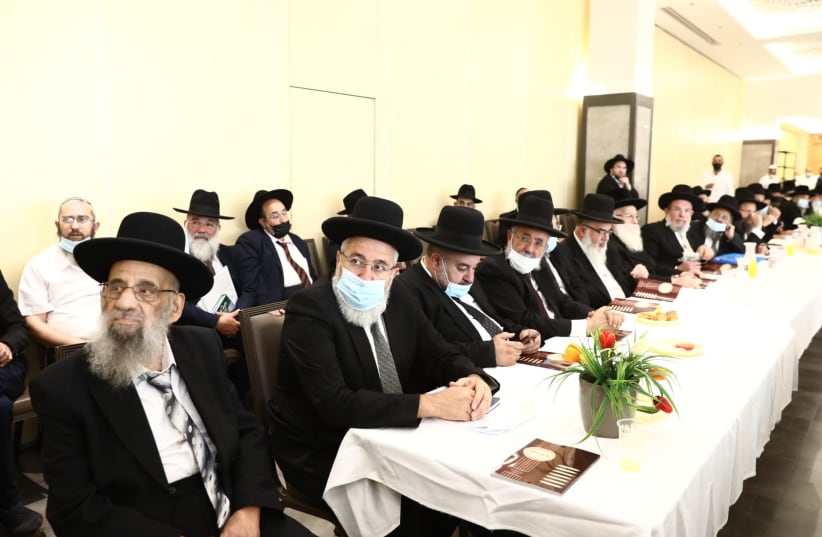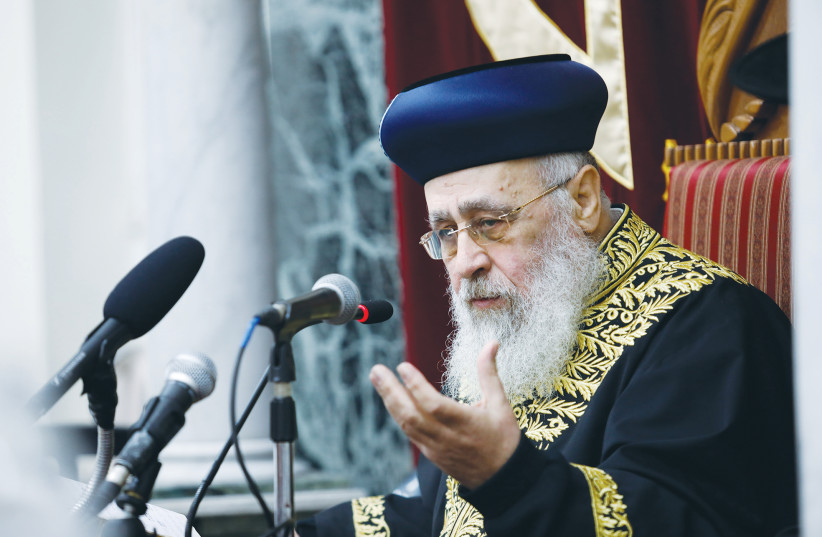The average period of tenure of a municipal chief rabbi is three decades, the average age of municipal chief rabbis is over the age of retirement, and all serve without term limits until at least the age of 75, and in numerous cases beyond.
The longest-serving municipal chief rabbi has held his office for the last 64 years, two municipal chief rabbis are 90 or older, seven are over 80, and one has a criminal conviction for witness tampering.
This is just some of the data revealed by statistics obtained by the Ne’emanei Torah Va’Avodah organization from the Religious Services Ministry and seen by The Jerusalem Post. Ne’emanei Torah Va’Avodah represents Israel’s Modern Orthodox movement.
There are some 88 municipal chief rabbi positions in cities and local authorities throughout the country. They have a major say over religious services in their jurisdictions, including critical issues such as marriage registration and kashrut licensing, and have high salaries.
Once they are elected by a special electoral body, municipal chief rabbis have the position for life without term limits or the need for reelection.
They can serve up to the age of 70, with an option to extend their service until 75. Those elected before 1974 have no mandatory age of retirement.
There are currently 14 municipal chief rabbis without any mandatory age of retirement.
This has led to a situation in which municipal chief rabbis can become disconnected from the residents of their cities, can verbally attack entire population groups without fear of consequence and can even be convicted of severe crimes and remain in position, according to Ne’emanei Torah Va’Avodah.
Currently, the longest-serving rabbi is Rabbi Moshe Hadaya of Eilat, who was appointed in 1957, before the advent of the integrated circuit, at the age of 22.
Another seven rabbis have served for more than half a century, 17 have served for four decades and another 17 for three decades.
The average of a municipal chief rabbi is 68.5, a year and a half older than the statutory age of retirement.
Eleven cities have two chief rabbis, an Ashkenazi one and a Sephardi one.
The minimum wage for a municipal chief rabbi is NIS 22,772 a month, or NIS 273,000 a year, for those who serve cities of up to 5,000 residents, while those serving in cities of more than 250,000 people receive at least NIS 400,000 a year, or NIS 34,000 a month.
There is no mechanism to remove a municipal chief rabbi who is not functioning, such as Rehovot Chief Rabbi Simcha Kook, who is 91 years old and has held his position for 49 years.
For religious services to continue being provided in the city, an acting municipal chief rabbi has been appointed in Kook’s place, although Kook continues to receive his salary.
The Chief Rabbinate is reluctant to discipline errant rabbis.
Rishon Lezion Chief Rabbi Yehuda Wolpe, 90, has served in his post for 51 years, even after being convicted of witness tampering in 2018 after an employee in the local rabbinate filed a police complaint against him for alleged bribery.
Wolpe remains in his job since the Council of the Chief Rabbinate has refused to remove him from office.
In other situations, the municipal chief rabbi has turned against parts of the population he is meant to represent and serve.
In 2014, Jerusalem Chief Rabbi Shlomo Amar received votes during the tight election for the position from liberal and non-Orthodox representatives on the electoral body and met with a prominent Conservative rabbi to secure this support.
In 2017, however, Amar denounced non-Orthodox Jews as worse than Holocaust-deniers and described homosexuals as “a cult of abomination” and asserted they should get the death penalty, according to Halacha.
Tani Frank, head of Ne’emanei Torah Va’Avodah’s religion and state department, which has advanced the cause of term limits for municipal chief rabbis, said these circumstances have led to a situation in which many municipal chief rabbis are disconnected from the public they are meant to serve, citing Amar as a prime example.
To reform the institution, Ne’emanei Torah Va’Avodah advocates for a term limit of 19 years for all municipal chief rabbis, with an option to be reelected.
The organization also says the position should be elected by the local municipal council and not the special electoral bodies that currently select municipal chief rabbis, since municipal councils more fairly represent the democratic makeup of the rabbi’s constituents.
These changes would make the rabbis more accountable to the public they serve, Frank said.
“If the rabbi is totally disconnected from the community, and on occasion, reality, it does not give honor to anyone,” he said.
“It is just so basic that there should be some accountability to the community that the municipal chief rabbis serve to be their actual spiritual leader,” he added. “When you hold a public office, it is not reasonable that you can become an extremist without consequences.”
Earlier this year, Religious Services Minister Matan Kahana (Yamina) suggested he would institute term limits for municipal chief rabbis. However, a spokesman for Kahana said the issue was now below other items on his agenda, such as kashrut reform, conversion reform and changing the composition of the selection committee for the two chief rabbis ahead of the 2023 elections for those positions.

